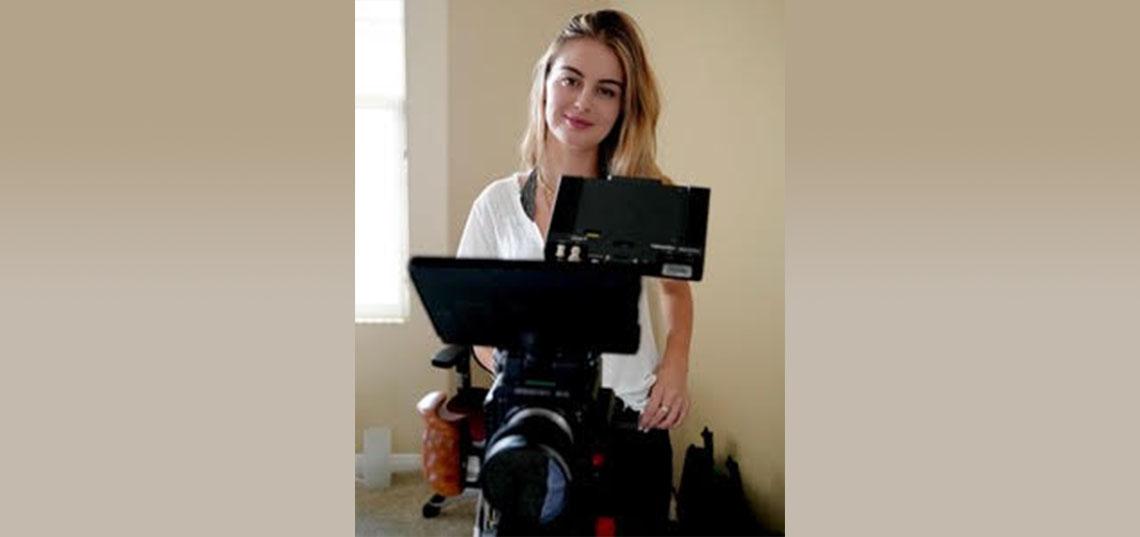
Jamie Logan JMS’20 is a documentary filmmaker who focuses heavily on social justice-related issues, animal rights, and the environment. She’s an associate producer for CaveLight Films, oversees nationwide vegan campaigns for Generation Vegan, and is a content contributor for vKind, a vegan business app. She shared with us how she’s cultivating change through film and media since graduating from SC&I with a degree in Journalism and Media Studies (JMS).
SC&I: How did the JMS major prepare you for your career?
JL: JMS gave me the resources to explore so many different things. I had my hands on cameras and I was able to write scripts. It was very interactive! JMS gave me the confidence to go into major businesses and corporate companies and feel that I could do the job. When I was a student, I had internships at SiriusXM, CNBC, and Townsquare Media. I don't know if I would have been confident going to these companies and saying, “I want to work for you” if it wasn't for the resources that JMS provided me with. For a company like SiriusXM, I was kind of thrown in there, and I didn’t know exactly what the role was until I started doing it. But I knew that because of JMS, I was able to do video editing and audio editing. I knew how Premiere worked and how to work a C100 camera. These were things that we were able to get our hands on. So, when I went into my internship, my managers were like, “Oh wow, she really knows what she's doing!”
SC&I: What other resources did the JMS provide for you?
JL: When you're in college, you don't really—at least I didn't really—know exactly what I wanted to do. So it was important that I was able to explore different paths and outlets, whether it was being in broadcast media, doing more behind-the-scenes editing, or writing scripts. JMS allowed me to try out all of these different arenas. I did on-camera classes with Professor of Professional Practice Steve Miller. I took classes in Magazine Writing and Broadcast News Writing and Reporting where we would go around campus and ask people questions; these classes prepared me well for what I'm up to today. I have a YouTube channel where I make videos approaching people in the park and asking them questions about the ethics of eating animals. I'm not nervous at all now, because I have all the experience to just go up to people and say, “Let's chat!”
SC&I: Did you participate in any JMS-related clubs or extracurriculars?
JL: I ran the Veg Society at Rutgers. I scheduled a lot of field trips where I invited speakers to come in and give presentations on health, the environment, and animal rights. Throughout college, I was an animal rights activist. I would actually go to slaughterhouses every other week and film and give the animals water. I was able to then take that footage and edit it together, and, as part of what I did within the JMS major, write papers and make videos about these issues that I really cared about. The work that came out of JMS was work that I could actually use and that I look back on and feel that it’s still relevant today.
SC&I: What advice do you have for incoming JMS majors?
JL: Follow your passion. College is really about finding out who you are, what you like to do, and what important issues you want to support. With any type of job, I don't want to be doing something 9 to 5 that I don't love or don't enjoy. I knew that if I was speaking up for a cause that I really cared about, it wouldn't feel like I was working a day in my life. It’s okay to get uncomfortable. It's okay to not know what you're doing at first, but use that as an opportunity to grow. When I first had my hands on a big camera and I didn't know where all the buttons were, I was a little frustrated. But, I forced myself to do it and to learn it, and I'm so grateful for the opportunities that JMS provided. I remember when Assistant Professor of Professional Practice Neal Bennett told us he was going to teach us how to work Premiere Pro and I was looking at all these buttons and tabs, thinking, “What is this? I never want to use this!”—now, I use it every single day in my work. So, you know, things can be daunting at first, but I think the uncomfortability is where the most growth happens.
